|
From Chris at CaribbeanPot.com. Check out his videos on YouTube.
he Tobago Cocoa Estate has once again made an international name for itself, having won a silver award at the 2019 International Chocolate Awards for its Laura dark milk chocolate bar.
Owner Duane Dove shared the great news via social media. “LAURA WORLD SILVER 2019! We are elated our LAURA 45% bar has again brought home yet another prestigious award at the 2019 International Chocolate Awards WORLD finals in Guatemala on 18th November 2019. We would like to thank the judges at the ICA for recognizing us!” Dove said. The estate, located in Roxborough, Tobago, won gold for its Laura bar in the milk bar category in 2017 and silver in 2018. The company also won gold at the 2019 Northwest Chocolate Awards for its Laura Dark Milk chocolate bar. The company exports chocolates to the Portland/Oregon area in the US as well as Sweden, Denmark and Germany. The company also conducts tours of the estate; for more information on the Tobago Cocoa Estate and the Rose Hill Estate, check them out on Facebook: https://bit.ly/2rCXapj or at www.tobagococoa.com  Sheldon Cunningham, right, Assistant Secretary, Division of Infrastructure, Quarries and Environment, with representatives of URP office, as they display agriculture produce for sale at World Food Day in Bacolet on Wednesday. PHOTO BY DAVID REID - DAVID REID Tobagonians were encouraged to change their eating habits so that the island’s agriculture sector can develop and a healthier lifestyle in young people can be promoted.
The advice was given by Chief Secretary Kelvin Charles at the opening of Tobago’s two-day World Food 2019 celebrations in Bacolet on Wednesday. Following this year's theme – Our action is our future – Charles reminded citizens of their role in determining whether, in years to come, “we face abundance or whether we face lack of abundance.”He said even though it’s not unknown that most of the imported goods coming into TT is processed and linked to an increased risk of several non-communicable diseases, “it remains more of a lamentation that is yet to be transformed into real action.” He added that “input directly affects output” and Tobagonians must “start connecting present decisions with future outcomes, regarding both our personal wellbeing as well as our island’s development.”Stressing that actions have consequences, Charles said, "This wisdom has been handed down from our ancestors and has also been taught to our children. This is why I am led to believe that type of thinking still exists in some measure in the collective thinking of our people.” e encouraged Tobagonians to continue to enforce proper eating habits in their children which will be “one that can yield a very promising harvest.”He said the change Tobago hopes to see from its agriculture sector will only materialise from what “we plant and rear mentally.”"Now is the time for us to tweak our mindset which may be harmful and which may prevent us from realising our fullest potential.”He said Tobagonians must move away from the growing dependency on imported processed foods. The Tobago House of Assembly (THA) has already began to promote local and healthy eating.According to Charles, these efforts will continue to reverse the heavy dependency of imported food through the Eat Local programme. Charles said he was most pleased when he saw younger Tobagonians showing interest in agriculture, through THA skill training programmes, earlier this year. “There are some who do not view those involved in the industry with the dignity and the respect that they so rightly deserved.” He reminded Tobagonians, “Our food production and food security constitute a large part of the future we enjoy dreaming about and this is the issue that shouldn’t escape us, as food will always be one of man's most basic needs. "Time is crucial and the gift of the present must be utilised to make pressing concerns known and to conceptualise and employ suitable solutions.” He called on farmers to remember their part in the management of Tobago’s natural resources. Charles also urged them to be open to the procurement and use of new technology to boost the sector. “Indeed, our ambitions are great and we want to increase our agriculture output and being to export as an island. However, it beseeches us to take care of that we already possess.”  Several years shy of his 40th birthday, Marc Farrell has already lived multiple lives. Born in Trinidad, he left his tropical home for the stately halls of MIT, where he began studying chemical engineering–at the age of 16. By 26 he would also hold a masters in philosophy from the University of Cambridge as well as an MBA from Harvard Business School. By 36 he had gone on to become the youngest Vice President in Starbucks history, heading up eCommerce and then global retail and beverage innovation. What might he have in store for 46? If Farrell has his way, rum will have a lot to do with it. The business impresario has traded in coffee for coladas with his latest venture: Ten To One. The nascent brand launched earlier this year with two expressions, a Caribbean White (priced at $29) and a Caribbean Dark ($43). Both represent a blend of liquids from esteemed producers across the islands. And as you can expect with someone as singularly focused as Farrell–there’s more to come. Here he talks about his journey from the boardroom to the bottle shop in an exclusive interview for Forbes. How did you come up with the idea for Ten To One? What were your inspirations? I’m always quick to tell enquiring minds that the story of Ten To One begins in Trinidad & Tobago. Not only because it’s the place of my birth, and the axis of my own introduction to rum, but because it was there, during a visit by my friend (now co-founder) Zac Waksal six years ago, that the early seeds for Ten To One were planted. It was on that trip, as Zac spent time with my family and I over New Years, that we often discussed how surprised he was at the differences between rum as he knew it in the US, and the way that he saw it brought to life during that trip to Trinidad – a diverse and elevated spirit, that played a pivotal role in many of the special moments of celebration we enjoy in Trinidad, and in the broader Caribbean. Over the course of the next few years, we would continue to talk about how big a gap there was between the experience of that trip, and the way that rum was typically positioned in the US, until we started working on the concept in early 2018, once the call to begin developing the brand became virtually impossible to ignore. I knew very early in my career that I loved the consumer space, and specifically the idea of creating brands; And I’ve always loved storytelling and been inspired by those who can bring a product to life in the hearts and minds of consumers. Ten To One allows me to fulfill that passion and ambition in a very unique and personal way, as the brand is derived genuinely and directly from the way that I see the world – whether my long-held passion for the spirit, my love of all things brand, the deep pride that I take in my Caribbean roots and culture, or the inspired community of folks that we hope to share the brand with. How did growing up in Trinidad influence your experience of rum? Through the lens of Trinidadian culture, I understood rum to be an extremely versatile spirit with a number of premium expressions, that played a pivotal role in many of the moments of celebration – both big and small - that we enjoyed as a people. What gaps in the market does Ten To One Hope to fill? While seemingly every other spirit – vodka, tequila, mezcal, gin – has been disrupted, and elevated in the US and beyond, rum has seemingly stood alone, too often relegated to a very narrow, preconceived set of drinking occasions and marketing plotlines, and under-appreciated for the breadth and quality that the category has to offer. As someone who is born and raised in the Caribbean, I really believe we have an enormous opportunity to further elevate the conversation around rum – not only by introducing a high quality spirit to market, but by broadening both the current narrative around rum, and the occasions for which it might be considered the spirit of choice for today’s consumer. Beyond the rums themselves, what do you see as Ten To One’s overall mission? As a company, we frequently discuss our objective to.. “create a contemporary and elevated blend, designed to challenge expectations and reinvigorate the way people taste, experience and talk about rum” But beyond the rum itself, we’re inspired everyday to provide consumers with a window into a more contemporary view of Caribbean culture, through the lens of Ten To One. For far too long, I think the category has suffered from an overly narrow and somewhat caricaturized and uninspired positioning. Coming from Trinidad, my experience with rum has been very different, and the more I looked into the space, the more convinced I was that we could offer something truly different and invite the modern consumer to join us on that journey. How will you measure success with this latest chapter of your life? Like anyone else creating a spirits (or consumer) brand, I think the ultimate reward comes from being able to share what you’ve created with others, see them develop resonance with your product and its reason for being, and ultimately having it contribute to moments of celebration and community in their own lives. Finding an opportunity to bring some of that same passion to life in the US market, is at the heart of what we aspire to achieve with Ten To One. New Yorkers can already find the brand behind the bar at some of the city’s hippest watering holes and restaurants, including The Aviary, Momofuku Noodle Bar, Cote/Undercote, Gramercy Tavern, Up & Up. Look for it on liquor shelves nationwide in the months to come. Source: https://www.forbes.com/sites/bradjaphe/2019/10/16/the-life-and-times-of-marc-farrell-from-starbucks-youngest-ever-vp-to-craft-rum-impresario/?fbclid=IwAR1MICtobViTQLx07g335rMM4ZuWlaSyVr3WK40A-l78xDcYZOW_BMhzfw8#67e4fed54eea  “The leaves of the chadon beni is rich in iron, carotene, riboflavin, and calcium, and are an excellent source of vitamin A,B, C. This herb also has medicinal properties. The leaves of the plant is a good remedy for high blood pressure, and epilepsy. In some Caribbean countries it is called fitweed because of its anti-convulsant properties. It is a stimulant and has anti-inflamatory and analgestic properties. As a matter of fact, the whole plant could be used to cure headache, diarrhea, flu, fever, vomiting, colds, malaria, constipation, and pneumonia.” Ingredients
table salt 1/2 pound elbow macaroni (about 2 cups uncooked pasta) 3 tablespoons vegetable oil 1 1/2 pounds ground beef (85% lean) 2 medium onions, chopped 1 red bell pepper, stemmed, seeded and chopped 6 garlic cloves, minced 1 1/2 tablespoons chilli powder 1 tablespoon ground cumin 1 (28 oz) can crushed tomatoes 1 (14.5 oz) can diced tomatoes 1 tablespoon light brown sugar 12 oz Colby Jack cheese, shredded (about 2 1/2 cups) (or cheese of your choice) Directions 1.Preheat the oven to 400 degrees. 2. Bring 4 quarts water to a boil in a large pot over high heat. Stir in 1 tablespoon salt and add dry macaroni; cook until al dente. Reserve 3/4 cup pasta water and drain pasta. Transfer to a large bowl and set aside. 3. Using the same large pot, wipe dry and heat over medium heat. Add 1 tablespoon oil and heat until shimmering. Add ground beef and break it up in pieces to brown. Once browned, remove from pot and discard drippings. Set beef aside. 3. Add remaining oil to the same large pot and return to medium heat until shimmering. Add onions, garlic, red pepper, chilli powder, and cumin; cook, stirring occasionally until vegetables are softened and begin to brown. 4. Add the crushed tomatoes, diced tomatoes, brown sugar, reserved 3/4 cup pasta water and beef to the pot. Bring to a simmer and cook for 20 minutes, stirring occasionally until flavours have blended. 5. Stir in the cooked pasta, 1/2 cup of shredded cheese and season with salt and pepper to taste. Transfer mixture to a 9x13 baking dish and smooth over with a spatula. Bake in the preheated oven for 30-35 minutes or until the mixture is hot and bubbling. 6. Remove from oven and sprinkle the top of the dish with the remaining shredded cheese. Return the dish once again in the oven and bake for 5-10 minutes until the cheese begins to melt and brown. Cool for 10 minutes before serving. Source: The Loop, August 2019 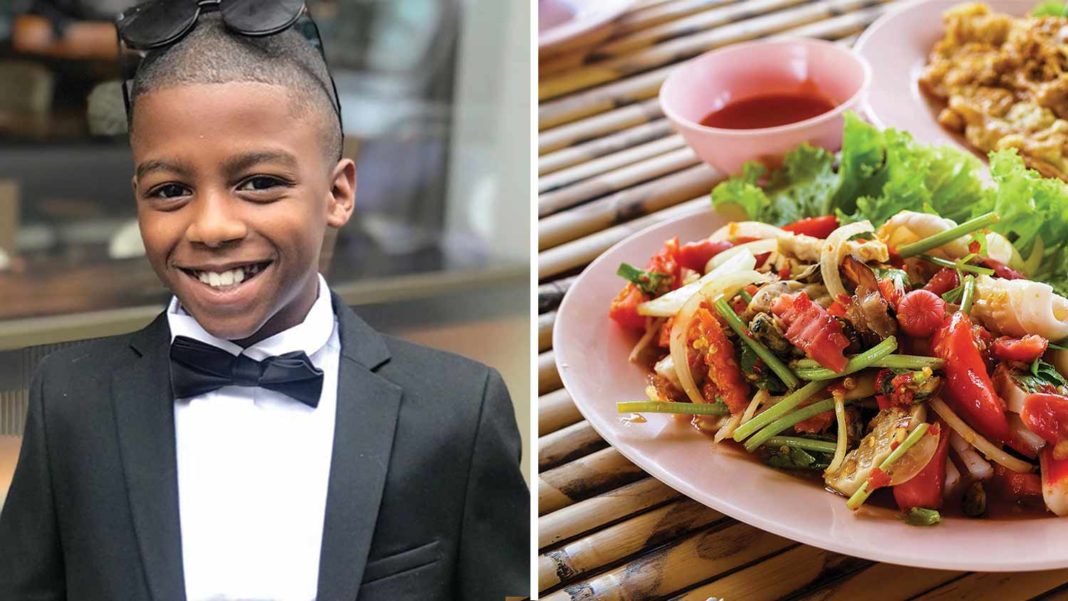 at Smith Senior Editor, LIVEKINDLY | New York City | Contactable via: kat@livekindly.com Eleven-year-old entrepreneur Omari McQueen is the youngest award-winning vegan chef in the UK. In addition to being the founder of his own company, Dipalicious, he’s now CEO of a restaurant of the same name. The pop-up will take place at Boxpark Croydon this summer. While menu details have not yet been released, McQueen loves sharing vegan Caribbean food on his Instagram, such as BBQ jackfruit with breadfruit fries and curry. His company Dipalicious makes vegan dips inspired by Caribbean cuisine, such as Luv’in Jerk, Caribbean Kick, and Coco Curry. Vegan snacks will launch soon, according to the website. “I can’t believe my dreams are coming true,” McQueen wrote on Instagram earlier this month. McQueen learned about veganism from a PETA UK video at just eight-years-old and became determined to make food that could be enjoyed by all. He also wanted to teach other children about vegan food. One year prior, his parents ignited a passion for cooking in young McQueen, who was taught to cook after his mother fell ill. While making vegan pizza on his YouTube channel, he found that the end result was too dry and, not knowing if Heinz was vegan, he made his first dip. It was a hit with friends and family, which inspired him to found Dipalicious. He began saving for his own bus-converted vegan restaurant as well as ready meals for kids. Today, he also hosts kids’ cooking workshops from home. The young entrepreneur’s accomplishments have already been recognized a number of times. In 2018, he won the TruLittle Hero Award for being the Entrepreneur Hero under 12 by Cause4Children Ltd. He won the Compassionate Kid Award from PETA for his work helping animals last November. “His compassion and his determination to create a better world for animals are a wonderful example for other kids – and adults – to follow,” said PETA director Elisa Allen in a statement. He also won the Proud & Gifted Award for his work as a vegan chef and youth empowerment speaker. Dipalicious’s vegan pop-up restaurant will take place at Boxpark Croydon from August 17-24. Chef James Whetlor, and Chef Bianca Bianco put out dishes cooked by participants at the Goat - More Than Just Curry course at The Academy for Baking and Pastry Arts in Woodbrook on June 28. Photo: Marlon James James Whetlor didn’t know what to expect when he came to Trinidad and Tobago. But when he left, he took with him a love for doubles, the joy of eating a mango plucked from a tree, an appreciation of T&T’s cuisine and a heart filled with pride because an event he created has taken root in places he never imagined. Whetlor is the man who popularised Goatober in the United Kingdom and Europe, an event that was started in the United States with Erin Fairbanks and renowned cheesemaker Anne Saxelby who wanted to end the practice of euthanising young male goats for which the dairy industry had no use. Goatober was created as a month-long celebration on the menu of New York restaurants as a way to promote goat meat as delicious, ethical and sustainable. In 2016, UK Whetlor, a chef and owner of Cabrito, introduced Goatober to the UK and to mainland Europe the following year. Whetlor made his first visit to Trinidad last week for the official launch of GoatoberTT, an initiative by media personality and food writer Franka Philip. Over the weekend, he did workshops with farmers of the Sheep and Goat Farmers Society, with chefs at the Academy of Baking and gave interested diners a taste of roasted goat at an event called Cuisine Cruisin. In Europe, Whetlor’s mission is to popularise goat meat and save 1.5 million goats from being euthanised. In T&T, where there is already an appreciation for goat, albeit in curry form, the mission is different, he said. “Bringing Goatober to Trinidad and Tobago gives us, rather than in the UK or Australia, a certain amount of authority. If the idea of Goatober can be accepted by people who are the experts, then it gives us a little bit of kick and I am grateful for that,” he said at the launch. He said while in T&T there is a cultural barrier to selling goat’s milk in the UK there is a cultural barrier to selling the meat. Goatober, he said, is about sharing knowledge and skills. Speaking to Loop at the end of the weekend, Whetlor said he was able to impart to chefs new ways of cooking goat meat. “We had 10 chefs, none of them ever cooked goat any other way than currying it and they were interested, asking questions, engaged, bringing their own ideas and that is what you what. You want guys to go away inspired and say right, this is what I am going to do and where do I get my Trinidad goat and not use one of my recipes from the book or do anything I have done but take their own experiences and inspiration and do something new with it,” he said. UK Chef and goat advocate James Whetlor teachs farmers from the T&T Goat and Sheep Farmers Society about the fundamentals of goat butchery at the UTT ECIAF campus on June 27. Photo Franka Philip Whetlor said he is really proud of the fact that Goatober has become international and taken and molded to suit a purpose that is for the betterment of the people that do it.
“Goatober has molded itself to fit what it has to fit and that is an amazing thing,” he said, hopeful that it creates a new revenue stream for local farmers. Whetlor will return to T&T in October, the month Goatober is celebrated. He said he does not expect to see big changes by then but expressed hope that over the years, people’s approach to cooking goat would change. He advocated for more local goat to be purchased, noting that Trinis have a lot of civic pride. “From what we are trying to achieve with GoatoberTT, part of the message will be to support your local farmers, buy local goat.” Source: The Loop, August 2019 It may not be T&T's national dish, but it's still a local favourite.
For this week's Sunday Luch, we feature a Breadfruit Oil Down Recipe from Massy Stores Trinidad. 1/2 lb salted pigtail, cut into 2-inch pieces 1 green hot pepper (whole) 1 onion, chopped small 1 bunch chives, chopped small 2 cloves garlic, crushed 1 leaf chadon beni, cut up finely 2 1/2 cups dasheen bush leaves, chopped (discard stalks) 1/2 cup pumpkin, cubed 4 okra, chopped salt, if necessary thick coconut milk (preferably freshly made, but unsweetened canned or frozen can be used too) Directions 1. Boil salted pigtail in water until soft, then discard that water. 2. Peel and seed breadfruit and cut into wedges of about 1 1/2 inch thick, lengthwise. Add breadfruit to boiled pigtail and cover with 1 cup of water. 3. Add 2 cups of coconut cream, then chive, onion, chadon beni, garlic, and whole green hot pepper. Add salt if necessary. 4. Boil until liquid has b(oiled) down, reduced, and the breadfruit is soft, but not falling apart. 5. Serve hot. Source: The Loop, August 2019 |
T&T news blogThe intent of this blog is to bring some news from home and other fun items. If you enjoy what you read, please leave us a comment.. Archives
April 2025
Categories
All
|
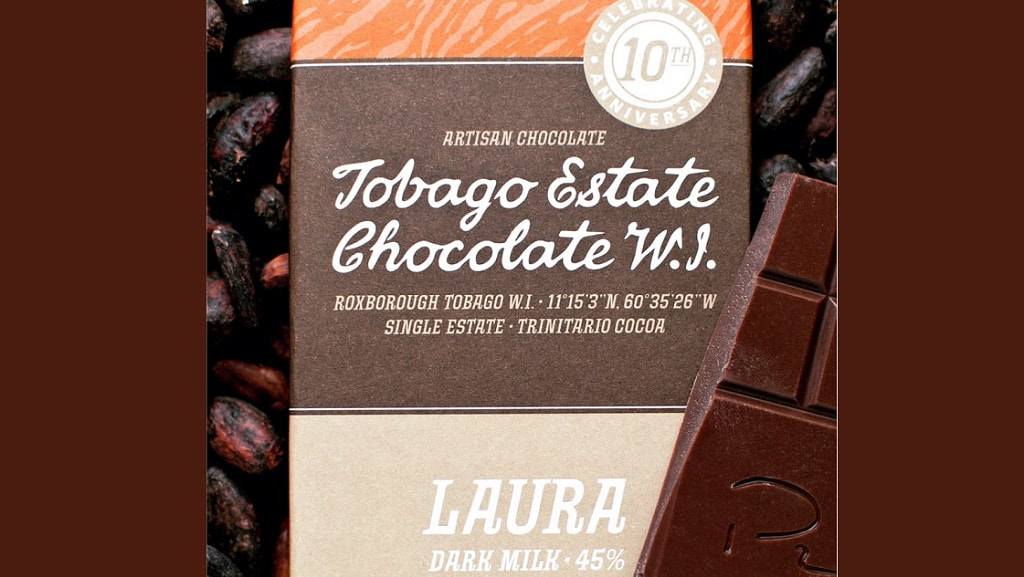

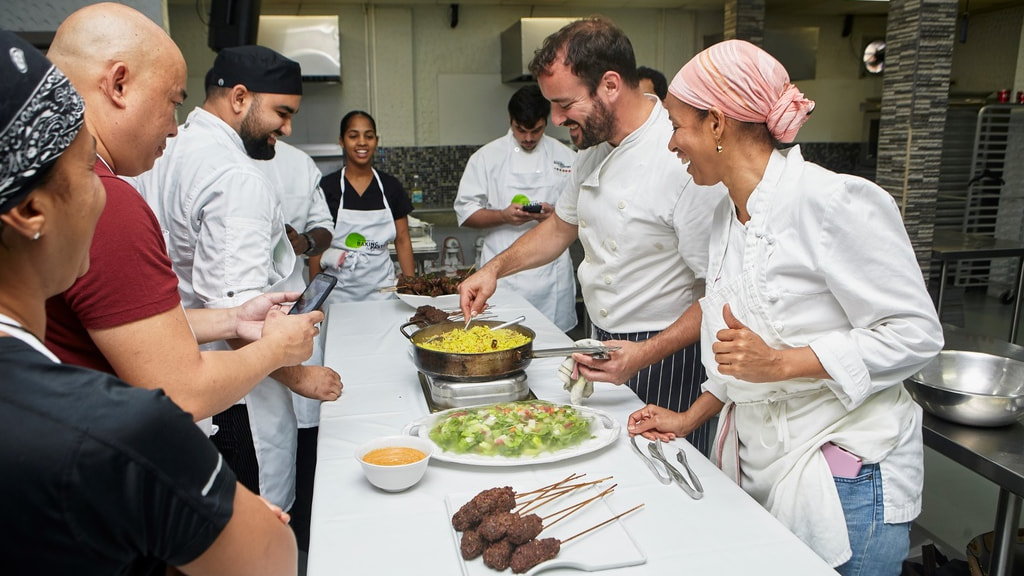
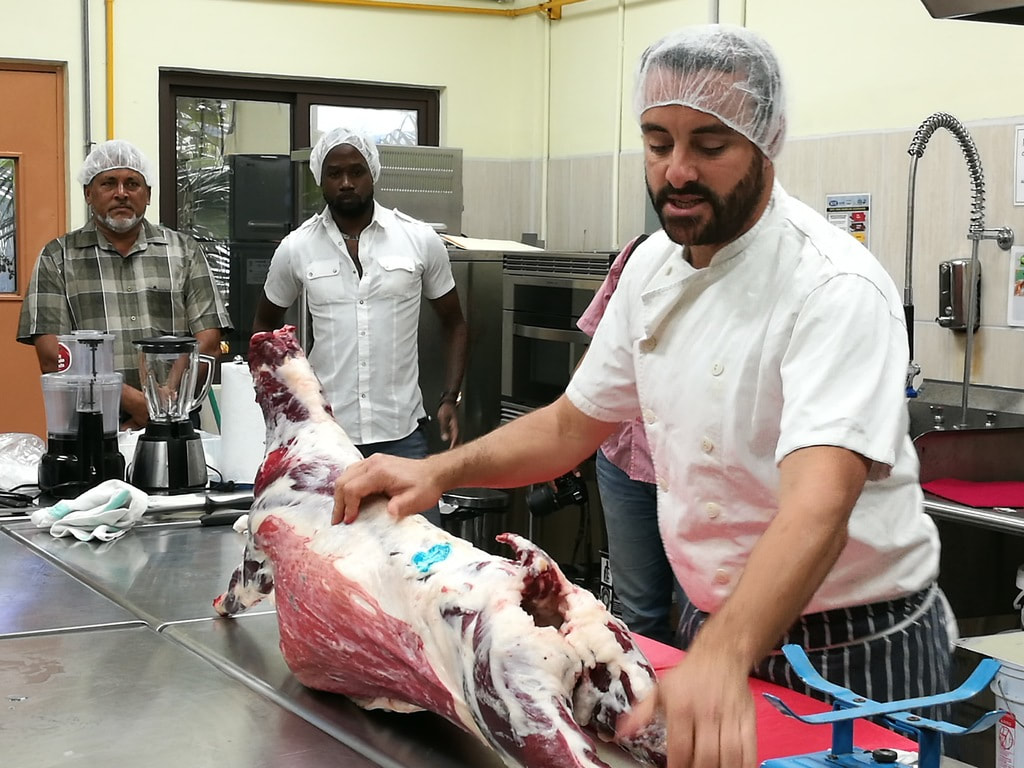
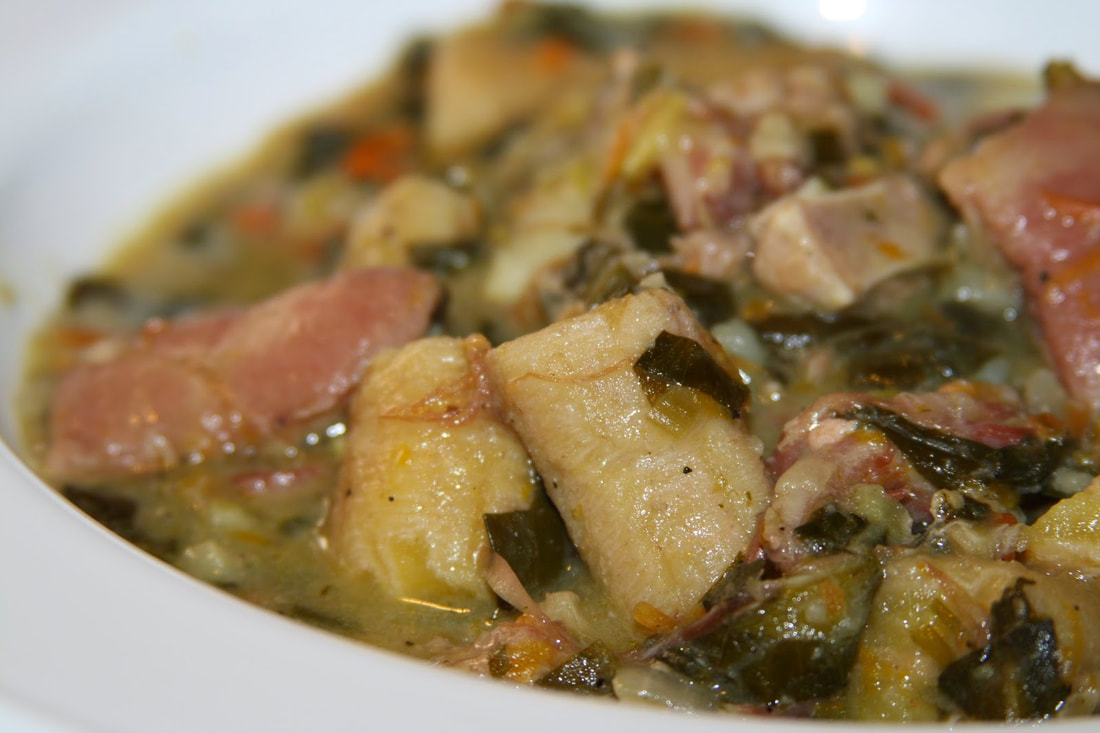

 RSS Feed
RSS Feed